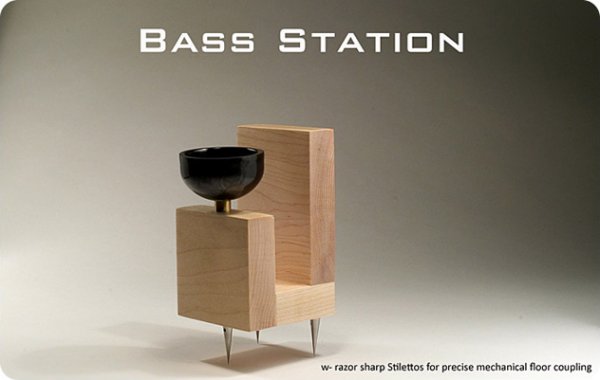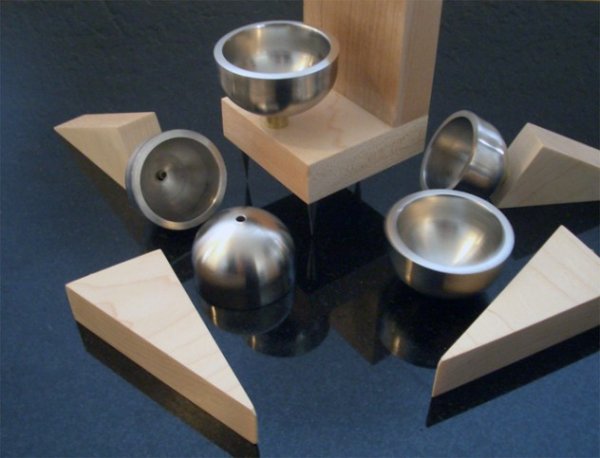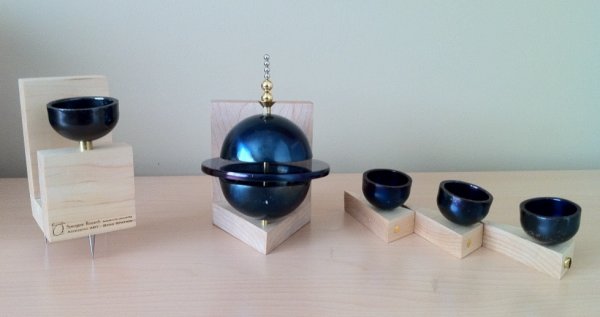In the video, they said you could hear a difference in the video.
Well, then I guess I have to take their word for it. Just like i believe everything I read. /s
In the video, they said you could hear a difference in the video.
I think if negative comments like these by people who haven't tried a product were made in the SR forum, this thread would have been closed long ago.
I would rather sit back and wait until someone unbiased, credible that would go through an exhaustive amount of testing that understands how to test room treatment before I get on any bandwagon trying to "sell" this type of product.
The only thing is that the last thing you're doing is "sitting back". You're actually going from thread to thread, making sure everyone knows how much you love and demand measurements, while you yourself do not move a finger to provide such measurements.
I'm very sceptic of this kind of gizmos too, but I don't feel the need to demand people prove their results to me, nor do I demand the company sends me freebies so I can test, like you did.
alexandre


I give up. Continue preaching to the usual "measurements first" crowd.
And, for the record, I'm not defending the product, as I've never heard it, nor do I have the intention of doing so. I just oppose the systematic thread crapping that's going on.
alexandre
Negative? No. I see it as a pragmatic approach to a product of this type. I would not "TRY" a $1000 product just because someone tells me to do so when I see no valid studies, data, that makes me feel like it's something plausible.
If someone sent me the product, I would amuse them by trying them, but I honestly wouldn't expect any major difference.
I would rather sit back and wait until someone unbiased, credible that would go through an exhaustive amount of testing that understands how to test room treatment before I get on any bandwagon trying to "sell" this type of product.
I was VERY skeptical of high end audio cables back in the late 80's when I first came into contact with them. I tried them, but did not spend a dime until AFTER i listened to them enough to be satisfied with the difference. It also took me quite some time to get my ears trained to actually figure out what to listen to as it does take time. I also read about how at least one company tests audio cables and the technical discussions behind WHY one cable has a different tonality to another. But there are plenty of different tests to prove that one cable does have a variety of different response curves that will lend itself to sounding different better or worse. Now, when it comes to room treatment, I'm the same way. That's a discipline that's been proven and in existence for MANY years and it's an actually something that is taught in colleges around the world, plenty of books written, explanations of the physics, etc. behind it. But in all of the research that's been done in the area of acoustic treatment, no one has this product mentioned as being something credible. So far, it's just some marketing fluff and a handful of reviewers from profit making magazines, and a few people on message blogs that say they work. But I'm assured that this product needs to be validated by the acoustic engineering society or something similar in credibility that's completely un-related to the mfg, resellers, etc.
Do any reputable mastering studios use this product as a form of room treatment? NONE that I'm aware of. If a top mastering engineer were to use it, I might be so inclined to maybe think a little differently, but serious consideration?? I really would like to see some acoustic engineers that are certified run a variety of tests before I give it any serious consideration. This is not being negative, this is being realistic, please don't confuse the two.
I've seen products of this type come and go because they didn't earn the credibility from the people that know how to test these sorts of products. There was a product that one dealership showed me that you attach the back of a speaker cabinet that was supposed to improve imaging, or something of that nature. They stopped carrying the product after a few months, and that product didn't last long. It had some reviewers that gave it thumbs up too and I'm sure some people swore that it worked. But I'm sorry, I just didn't feel comfortable with that product enough to take it home, even as a demo. I have stores that will give me loaner product when I ask, but there's no Synergist dealer near me.
I prefer to have some credibility for products such as this and to me, a credible source would be from a certified acoustic engineer that shows test results and has spent a lot of time measuring and testing the product, especially in environments similar to my own.
I don't know who you are and you haven't provided me with exhaustive testing. So if you have the product and know how to test it with measurement equipment, then by all means, show some sort of proof that the changes the product makes is measurable and it's worth the money. I know I can spend $1000+ on room treatment that I know WILL make a noticeable improvement to my room acoustics if I feel so inclined to do so.
I give up. Continue preaching to the usual "measurements first" crowd.
And, for the record, I'm not defending the product, as I've never heard it, nor do I have the intention of doing so. I just oppose the systematic thread crapping that's going on.
alexandre
Rich,
We get what you're saying, so constant repetition is pointless and wastes space.
Considering the quality of most recordings nowadays, I'd do the exact opposite they recommend.
BTW, do you think mastering engineers listen for the same attributes on recordings that audiophiles do? Hardly. But does anything help those Auratones?
In the end, money talks. No one is forcing you to buy them.
Engineers that design audio products, and other products for that matter DO MEASUREMENT TESTS of their designs from the first prototype to the finish product. PERIOD. Depending on what they are designing will dictate what measurements they are taking and how to refine their product to achieve a desired end goal. That's the design of ANY product. I've worked with engineers designing test measurement equipment for industrial purposes (NO Audio related) and I know that just don't simply design a circuit (product) without doing any measurements of any kind. Yes, in the audio world the subjective tests, which is what 99% of the population ultimately does since MOST OF US do not have test measurement equipment, know what tests to perform, etc. other than maybe a simple measurement from an OHM meter, that's the most popular test tool that we might have. Some have scopes of various types, some have these other room measurement tools, but by and large MOST people don't have test measurement equipment the mfg use. But in the end, if you are designing something, you should have some means of measuring the product to PROVE that there are differences between the BEFORE and AFTER of installing the product you are making. I'm not suggesting that tests are not going to be the definitive and only tests to look at, but if there are no differences in any test for a product such as this, then there is no valid proof that it does anything. I can go to any power amp, pre amp, etc. and either they publish their measurements/specs, or they don't, but if they do, each test will give us some clue as to why it might sound better or worse than another product with a different spec. Specs are useful to a point, but in the area of room treatment, if you have a properly tuned room to what an acoustic engineer would recommend, your system should response at it's best and produce good imaging, articulation, etc. etc. To just say your product improves imaging, etc. etc. is one thing, but at least prove that it's either improving the response of the equipment or the room acoustics.
Those bowls they sell are based on Helmholtz resonator theory, which IS proven, and it's been discussed by lots of acoustic engineers, etc. so they are just offering their devices in hopes that they will make a difference, but they are based on proven technology, science, etc. I haven't tried their bowls, but I do know that there is a little more to them, but I certainly do think they should be showing how to figure out if you need them, etc. That's what companies like ASC, Aurilex, etc. etc. that make room treatment. They first would prefer to measure your room. ASC developed the MATT test, and there are countless ways to measure room acoustics. Now, what an acoustic engineer will typically do is measure a room, find out what are the problem areas and then figure out what treatment you need and where to place it, and then remeasure and then see if it is smoothing out the curve, and then the listener will do listening tests to see if they hear no improvement, little or big and then they systematically will constantly remeasure to ring out the room. I don't know of a single room treatment product that fixes everything, I think that's impossible. So, what I'm getting at is does this thing do anything first, if so, what? And when should I use it, if it does do anything. Because maybe I can achieve the same result by just doing something different in the room that costs nothing or very little. This is where an acoustic engineer can be handy. But in order to know what the heck these things are doing, we need measurements as to how it changes either the equipment sound quality or the room acoustics. It's going to do one of the two or nothing at all. That's where measurements come in. IF you have a bass problem in your room, the acoustic engineer can identify what frequency they need to go after so they measure your room first and then they'll figure out what tube trap size and placement, or maybe another type of product to cure the problem. But without any measurements or explanation on the product, then the product is suspicious of being BS.
Would you buy a power amp where they had only a response curve of 1K to 10KHz, instead of 20Hz to 20K Hz? I would highly doubt that you would even LOOK at a power amp that didn't have a decent frequency response curve. Some specs can at least tell you SOMETHING about the product before you listen to it. If specs were meaningless, then why do people care about wattage. Knowing the wattage won't tell you how good it sounds, but it's recognized as ONE spec that people care about. Do you buy amps without knowing the wattage ratings? Really? You'd be one of the firsts audiophiles that I've met that don't know what wattage rating their power amp is.
Seriously, get off my back as I'm not the mfg. Do you think car mfg could get away without publishing performance tests? This product is a form of room treatment and ALL room treatment should be measured as to what and how it affects the room acoustics so that an acoustic engineer or consumer can figure out IF they need it, etc. Also, with this product, since it seems like a one size fits all, they should give you some indication as to what size rooms it can be used for. I highly doubt this can be used in a room that's a concert hall size vs a small room. Well, they should figure out what the limitations of room size are and tell people.
Rich,
We get what you're saying, so constant repetition is pointless and wastes space. I started this thread to ask about the HFT because I won some FOR FREE. Please relax a bit and enjoy discussions at WBF that involve products that have been acceptably measured.
Lee


You wouldn't care what wattage your amps were if you used horn speakers.
| Steve Williams Site Founder | Site Owner | Administrator | Ron Resnick Site Owner | Administrator | Julian (The Fixer) Website Build | Marketing Managersing |

